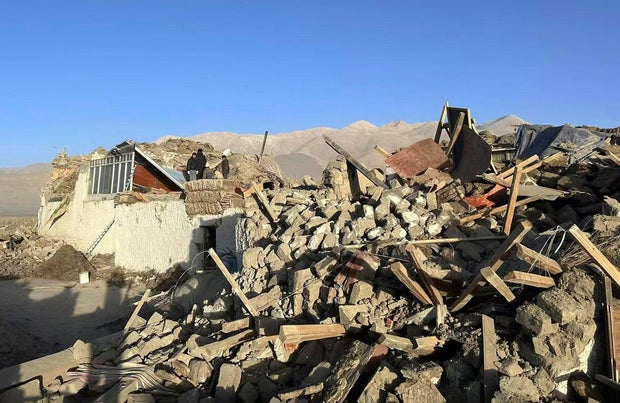Earthquake in Tibet kills over 100 people, China's state media say, with many others feared trapped
Beijing — A strong earthquake killed at least 126 people in Tibet on Tuesday and left many others trapped as dozens of aftershocks shook the region of western China and across the border in Nepal. The official Xinhua News Agency said 126 people were killed and at least 188 other injured in Tibet.
About 1,500 fire and rescue workers were deployed to search for people in the rubble, the Ministry of Emergency Management said. More than 1,000 homes were damaged in the barren and sparsely populated region, Chinese state broadcaster CCTV reported. Video posted by CCTV showed building debris littering streets and crushed cars.
The U.S. Geological Survey said the earthquake measured magnitude 7.1 and was relatively shallow at a depth of about six miles. China recorded the magnitude as 6.8.
The epicenter was about 50 miles northeast of Mount Everest, which straddles the border. The area is seismically active and is where the India and Eurasia plates clash and cause uplifts in the Himalayan mountains strong enough to change the heights of some of the world's tallest peaks.
The average altitude in the area around the epicenter is about 4,200 meters (13,800 feet), the China Earthquake Networks Center said in a social media post.
State broadcaster CCTV said there are a handful of communities within three miles of the epicenter, which was 240 miles from Lhasa, the capital of Tibet, and about 14 miles from the region's second-largest city of Shigatse, known as Xigaze in Chinese.
About 140 miles away in Nepal's capital, Kathmandu, the earthquake woke up residents and sent them running out of their homes, into the streets. No information was immediately available from the remote, mountainous areas of Nepal closer to the epicenter.
There have been 10 earthquakes of at least magnitude 6 over the past century in the area where Tuesday's quake hit, the USGS said.
Tibet is an autonomous region of China administered largely by its own democratically elected government, but under the control of Beijing, which claims sovereignty over the territory, insisting that it has been Chinese for hundreds of years. Chinese military forces moved in to quash a pro-independence uprising in 1959, sending the Dalai Lama, the region's anointed spiritual leader, into exile in India.
The Dalai Lama, now 89, has remained in southern India for decades, but is still looked to as the spiritual leader of Tibetan people around the world. China considers him a pro-Tibetan independence disruptor, even labelling him a "wolf in a monk's robe."
In a statement posted Tuesday on his website, the Dalai Lama said he was "deeply saddened to learn of the devastating earthquake that struck Dingri in Tibet and the surrounding regions."
He noted the "tragic loss of many lives, numerous injuries, and extensive destruction to homes and property," and offered his prayers for those affected by the disaster and his hopes for a rapid recovery.




